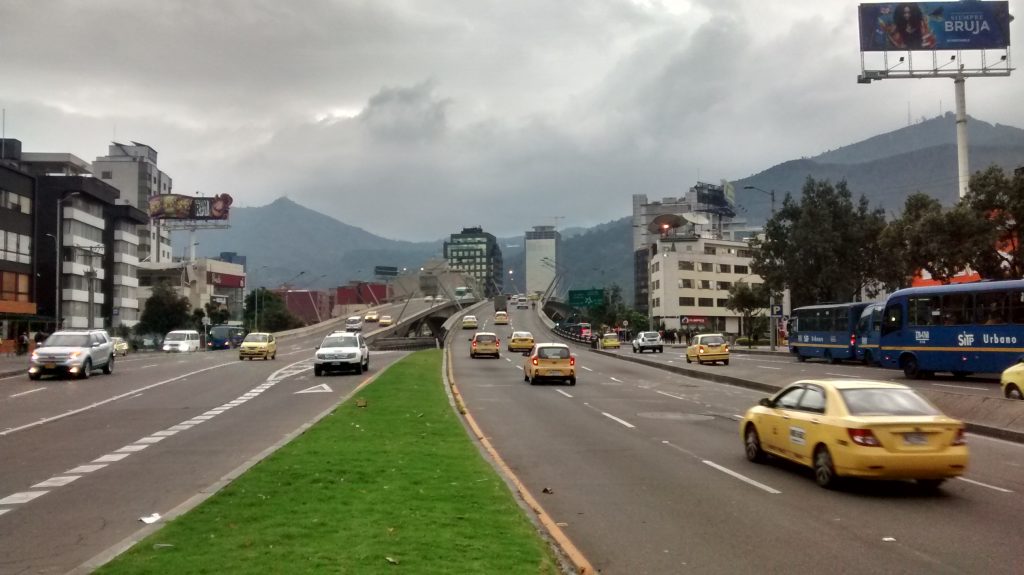
@wwaycorrigan
There is an expression we use in Ireland to describe those who put themselves before everybody else. We call them ‘mé féiners’, putting an English ending to two Irish-language words, ‘mé féin’, meaning ‘myself’.

Bogotá’s car-free day gave a glimpse of what can be achieved when we leave aside our individualistic instincts …
Basically, you could say these are a type of fundamentalist individualist. ‘The greater good for the greater number’ only comes into play if it means a significant gain for them. Otherwise, it’s not a runner.
The selfish gene
Of course, in many ways, we are all a bit like this, we are quite selfish beings. Many often talk a good ‘community game’, but on a normal day-to-day basis, it tends to be the self and, maybe, close family that occupy our minds rather than that ‘bigger picture’.
“Many wealthy people aren’t prepared to see their living standards drop.”
Take all those wealthy leaders and job creators, be they on the left or on the right, who live in a world far removed from the people they claim to help and represent. They are usually very reluctant to reduce their costly living standards, something that might help society as a whole.
Accidental goodness
On many occasions, that self-centred interest, more by accident than design, is favourable to more than just those closest to us. We, most of us I like to think anyway, work hard to have a better living, add more meaning to our existence, and others who we don’t know, who we’ve never met, benefit from this.
This work ethic contributes to the greater good — this applies less so to some areas of employment than others. (Again, what are those politicians about?)
However, on other occasions, and more frequently it could be argued, this self-centredness doesn’t add anything at all to the collective good.
Here in Bogotá, a city with considerable traffic congestion, you have those who insist on taking their private cars to work even when they don’t really need to. What’s more, the wealthier types have a number of vehicles at their disposal in order to circumvent some well-intentioned measures aimed at reducing traffic volume.
“No matter what we do, we’re doomed anyway.”
For sure, similar to many other places, public transport is far from ideal in the city. Yet, if more people started using it coupled with a resulting greater revenue generated to be pumped back into it, it would be better, more efficient and, keeping with the zeitgeist, greener. That’s the theory anyway. The practice in these parts is usually a long way off the mark.
Lap it up
There is the whole «Who cares?» mentality in all of this as well. Referring back to my Saving ourselves post from a while back, the argument can be made that no matter what we do, we’re doomed anyway.
Our way of life is going to drastically change soon, whether that’s in our lifetime or not, so let’s just enjoy the ride and lap things up as best we can. «Why inconvenience myself for future generations when the chance of the very existence of these future generations is in grave doubt?»
Fair enough. But there are ‘greater good’ measures we could take now that would result in an almost immediate benefit. How we commute on a daily basis is just one of those.
If we’d fewer vehicles with only one or two people sitting in them clogging up our highways and byways, practically everyone would benefit from that, even, nay especially, those currently in said vehicles.
Some people are just a bit too «mé féiner» to realise this.
___________________________________________________________
Facebook: Wrong Way Corrigan – The Blog & IQuiz «The Bogotá Quiz».




The ideal would be to go backwards: Use Skype and internet for virtual connections and allow people to live and work where they want, reducing the population density in cities. I can’t stand Bogota, I hate it, so I moved to a semirural area. It’s WAY better: clean air, lots of space to walk and exercise, less noise= less stress =better quality of life. Cities are cancerous places.
Califica:
-
Me
gusta
1
- No me
gusta
0
ReportarThat would be an ideal in many ways, Jaime. Personally, though, I do prefer face-to-face interaction, be that socially or for work. But certainly the amount of time many companies ‘demand’ their employees spend at work these days is totally unnecessary. I alluded to that in this piece … http://blogs.eltiempo.com/wrong-way-corrigan/2019/01/02/all-for-one-none-for-all/
Califica:
-
Me
gusta
1
- No me
gusta
0
ReportarI understand that in Bogota we need a more efficient and environment-friendly public transportation and no more individual solutions. But the problem is that our politicians and bureaucrats always use this statement to avoid investing in roads and highways but without doing anything to improve daily commuting. Bogota municipality punishes car usage with more taxes and contributions, but those funds are never used to something different than bribes and corruption.
Califica:
-
Me
gusta
0
- No me
gusta
1
ReportarI hear you Leo. It’s not only corruption, which we’re all well aware of, http://blogs.eltiempo.com/wrong-way-corrigan/2015/04/06/corrupt-colombia/, but there’s also a lack of any proper vision to deal with the big problems. Of course, these issues aren’t solely unique to Colombia.
Califica:
-
Me
gusta
0
- No me
gusta
0
Reportar